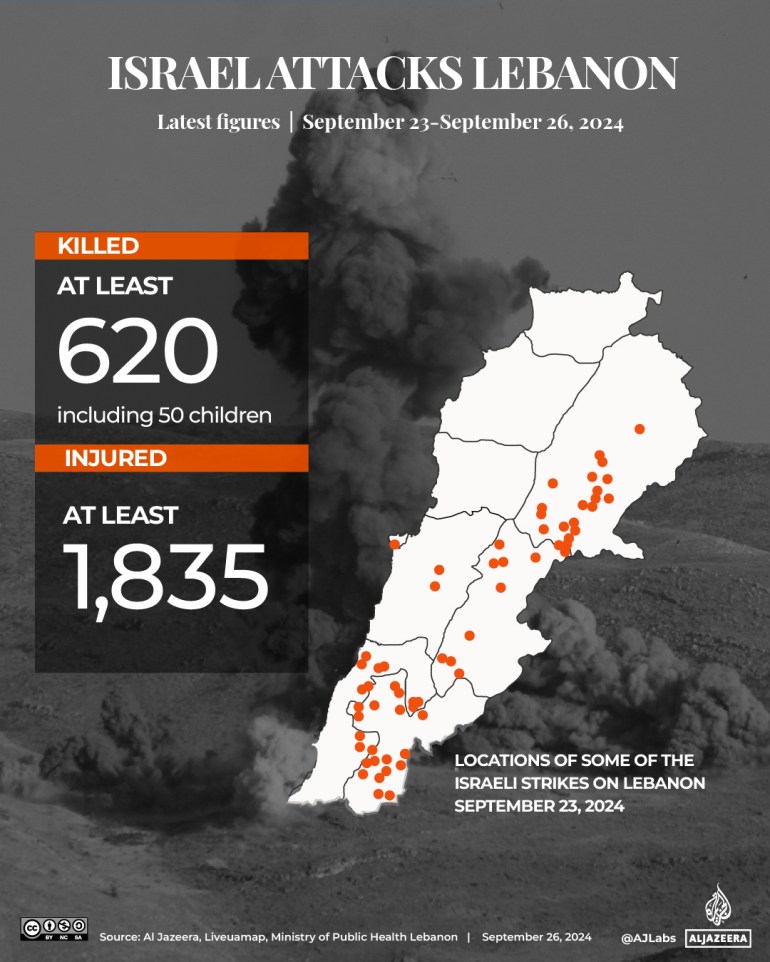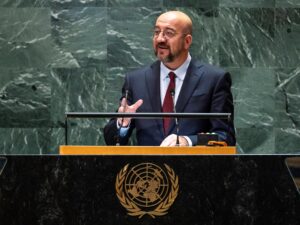Dozens of people have been killed in Israeli attacks across Lebanon, health authorities said, as Israeli air forces expanded their bombardment of the country for a fourth consecutive day despite growing international calls for a ceasefire.
According to an Al Jazeera tally, Lebanon’s Ministry of Public Health reported on Thursday that at least 29 people were killed in Israeli attacks – the majority of whom were Syrians in the town of Younine in the Bekaa valley, along the country’s eastern border with Syria.
Other attacks hit villages and towns in the country’s south, including Tyre, and at least two people were killed and 15 others were wounded in an attack in the suburbs of the capital Beirut, the ministry said.
The Israeli military said it killed Muhammad Hossein Sarur, whom it said was the head of the Lebanese armed group Hezbollah’s aerial unit, in the Beirut attack.
There was no immediate comment on the Israeli claim from Hezbollah.
In a series of statements on its Telegram channel on Thursday, Hezbollah said it fired more than 50 missiles at Ahihud, north of Haifa, and also fired barrages of rockets at Kiryat Shmona, military posts and a command base in different areas north of Israel. It said it used air defence weapons to force two Israeli warplanes to leave Lebanese airspace.
Thursday’s attacks came as Israeli officials appeared to reject growing international calls for a ceasefire. US Secretary of State Antony Blinken said world powers wanted a ceasefire and that he would be meeting with Israeli officials in New York. And in London, US Secretary of Defense Lloyd Austin said that there was still room for diplomacy.
“So let me be clear, Israel and Lebanon can choose a different path, despite the sharp escalation in recent days, a diplomatic solution is still viable,” Austin said.
The United States and France put forward on Wednesday a proposal for an immediate 21-day ceasefire, expressing also support for a cessation of hostilities in Gaza. But Prime Minister Benjamin Netanyahu swiftly made clear that such options were not on the table.
“Our policy is clear: we’re continuing to strike Hizbollah with all [our] strength, and we won’t stop until we achieve all our objectives – first and foremost the return of the northern residents to their homes securely,” Netanyahu said as he landed in New York where he is due to address the UN General Assembly on Friday. “This is the policy. Let no one mistake it.”
Thursday’s attacks are the latest in a dramatic Israeli military escalation in recent days that has forced more than 90,000 people in Lebanon to flee their homes. Since Monday, a wave of Israeli air raids killed more than 600 people and wounded thousands of others across Lebanon.
It is the deadliest week of hostilities between Israel and Hezbollah since they began trading near-daily fire along the Israel-Lebanon border last October, when Hezbollah began firing rockets after Israel launched its assault on Gaza.
For months, the exchanges were relatively low-intensity and largely restricted to border areas, but Israel has increased its attacks dramatically recently after it said it would shift its military focus from Gaza to its northern border.
Israel’s stated goal of its offensive in Lebanon is the return of tens of thousands of civilians to their homes in the north who were displaced due to the cross-border fire.
![]()
Israel has claimed to have carried out a series of assassinations targeting Hezbollah’s military leadership. Last week, the Israeli army killed in two separate air attacks Ibrahim Aqil, along with 15 other senior commanders of the group’s elite Radwan unit, and Ibrahim Qobissi, the head of Hezbollah’s missiles division.
The killing of the group’s top ranks came after a mass detonation of communication devices owned by Hezbollah rank-and-file members and civilian officers sent shockwaves throughout the country, killing more 42 people and wounding thousands of others.
There are growing fears about whether Israel could launch a ground assault on Lebanon. In the most explicit reference to a potential ground assault, the army’s Chief of Staf Herzi Halevi told troops stationed in the north on Wednesday to be ready for a potential ground operation.









More Stories
Denver breaks 132-year-old heat record
Kroger-Albertsons antitrust case comes to Colorado
In-N-Out Burger opening new location in Colorado